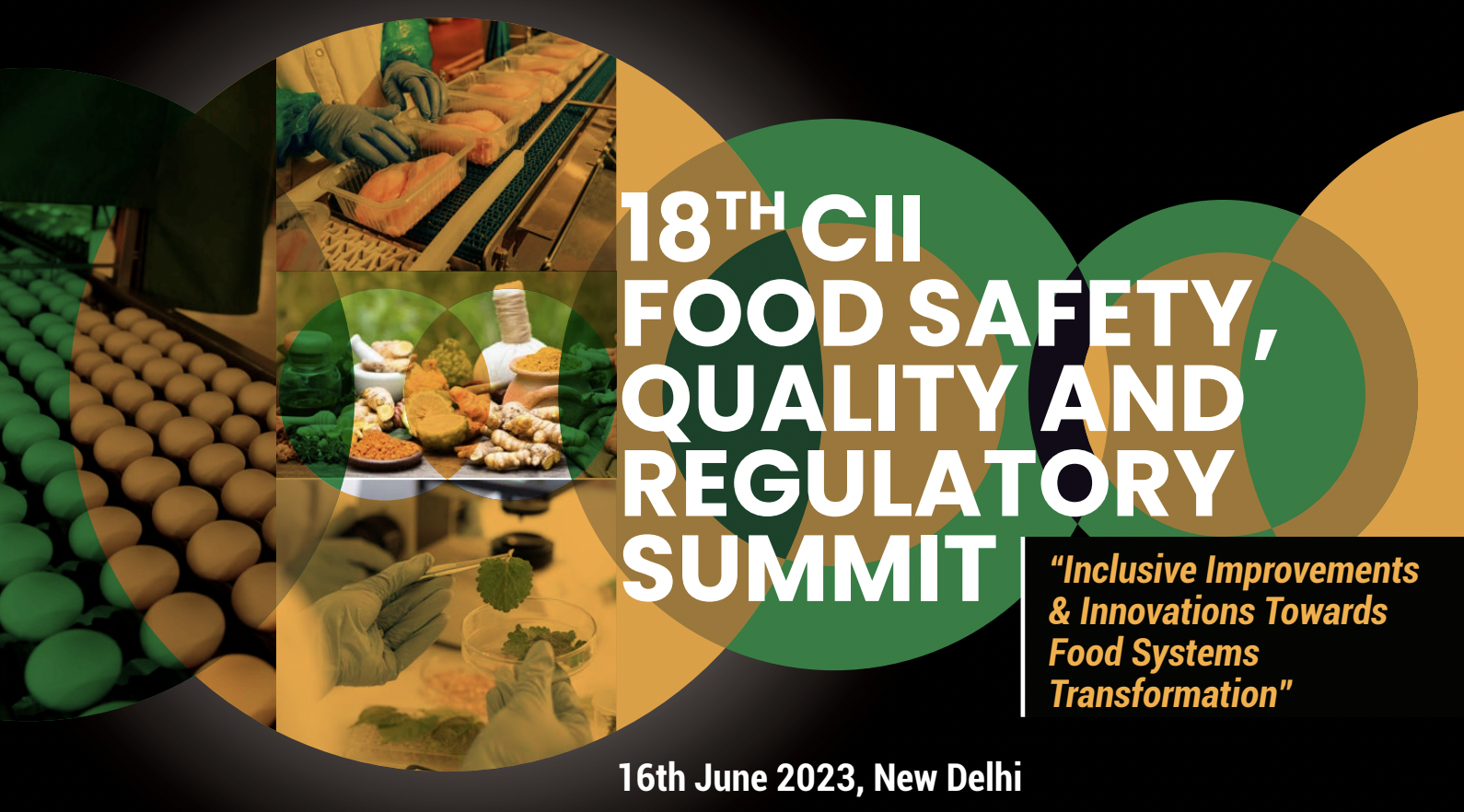
People’s wellbeing is determined by a healthy and nutritious diet, safe food and
access to safe drinking water. However, children in developing countries face a
triple burden of malnutrition (undernutrition, overnutrition and micronutrient
deficiencies). This threats the survival, growth and development of children,
economies and society as a whole. Globally, 20 percent disability-adjusted life
years are lost due to malnutrition, more than any other contributor and poor
diet contributes to 6 of the top 10 risk factors for the global burden of
disease. About 100 million cases of foodborne diseases (FBDs) are reported every
year, and unsafe food costs the country an estimated $15 billion a year. Unsafe
foods containing pathogenic microorganisms and toxic chemicals are responsible
for more than 200 diseases from diarrhoea to cancer. Hence it becomes important
to implement effective food safety programmes and traceability solutions as well
as access to safe drinking water for all.
This session will focus on
understanding the enablers which will allow for a sustainable food system
towards heathier consumption by people across their life course.
Inclusive business models enable the responsible integration of small-scale
producers into
markets with the underlying principle that there are mutual benefits for them
and the private
sector. It addresses the needs of low-income groups by providing goods,
services, and
livelihoods on a commercially viable basis, either at scale or scalable, to
people living at the
base of the economic pyramid by integrating them as a part of the company’s
value chain.
Several forms of inclusive business models are gaining prominence under the
agriculture
sector, ranging from production enhancing models through capacity building on
good
practices, contact farming models with assured market linkages, enhancing price
realisation
through technology interventions, etc.
The session will focus on showcasing the various forms of inclusive business
models which
are proving to be successful globally, the benefits they provide both to
industry as well as
farmers, and deliberate on opportunities towards scaling up towards maximising
impact.
Empowering and better price realization for producers and other actors in the
value chain is crucial for a prosperous food system. This can be achieved
through better terms of trade, cooperation, and most importantly,
collectivisation of farmers. Further, promoting and enabling of primary
processing towards enhancing rural incomes through value addition will help
secure livelihoods of the people.
Focusing on local employment is a crucial enabler towards prosperity, hence
there should be efforts on developing local employment and entrepreneurial
opportunities and maintaining biologically diverse landscapes for sustainable
intensification of agriculture. The food systems transformation should be
anchored around the small and medium-scale production, family farmers,
indigenous peoples, women and workers in food value chains to advance equitable
livelihood.
This session will look at understanding the enablers which will allow for a
gender responsive food system that empowers farming communities towards better
price realisation for producers alongside stable prices for consumers, allowing
for a prosperous ecosystem.
Micronutrient deficiencies cause morbidity and mortality in individuals,
affecting human
potential worldwide. We now know that the three-decade old estimation that over
2 billion
people worldwide are affected by micronutrient deficiencies (based on estimated
anaemia
prevalence) is a gross underestimation of the actual prevalence of micronutrient
deficiencies.
It is estimated that 56% of children 6 – 59 months and 69% of non-pregnant women
aged 15
– 49 years worldwide have at least one form of micronutrient deficiency. Also
known as
hidden hunger, it affects a significant portion of the population globally,
regardless of income
status.
Micronutrient deficiencies can be prevented and even eliminated if optimal
quantities of
micronutrients are consumed by populations on a regular basis. The three key
strategies
identified to address micronutrient deficiencies (MNDs) are: (a) dietary
diversification and
improvement; (b) micronutrient supplementation, and (c) food fortification.
Concerted, holistic
efforts are needed to understand, mobilize action and resources across partners
to bring
about tangible impact.
This session deliberates on the key strategies and proven interventions that
hold promise to
mitigate micronutrient deficiencies at the population level. Also, it brings
together key
partners from the government, research agencies/ think tanks, and the private
sector to
discuss key takeaways and evidence-based strategies, with specific focus on
low-and-
middle income countries.
Today's food system is faced with the dual challenge of improving
productivity while also
being environmentally friendly. Therefore, there is a need to adopt farming
practices that are
more nature-friendly and biodiversity-supporting, which involves limiting the
use of inputs
and promoting polyculture farming practices. There is a growing acknowledgement
of the
significance of incorporating agro-ecological practices in food production. This
approach can
potentially reconcile productivity and sustainability by promoting biodiversity,
reversing land
degradation, restoring ecosystem services, and ultimately strengthening the food
production
system. The mounting evidence shows that agro-ecological practices such as
improved
pollination and soil regeneration can lead to an increase in food production.
There are
various initiatives undertaken separately to restore pollination, soil health
improvement in
many countries including India. The need of the hour is to stitch a system level
solution,
embracing complexity, overcoming the silos and integrate interconnectedness
between
nature and production system.
To bring about the necessary transformation, it is essential to have a robust
collaboration
among multiple stakeholders and levels involving researchers, farmers,
governments, policy
institutions, and civil society organizations. This collaboration will expand
the knowledge
base. Additionally, businesses and financial institutions have a significant
role in
mainstreaming agroecological practices in the agro food supply chain. The agro
food sector,
as part of the market value chain, has the potential to create new
opportunities, improve the
production system, de risking the supply sources and become a transformative
force in
institutionalizing change.
Food items available in Informal markets like open markets, wet markets, small
stalls,
roadside eateries, and street food are affordable and generally nutritious food
which is
accessible to all. However, there are high food safety risks involved in
perishable food items,
food of animal origin and freshly produced food. There is hence a need to create
a
structured ecosystem comprising of awareness, training and certification,
third-party audits,
hygiene ratings of informal markets covering street food clusters, fruits and
vegetable
markets and other clusters. These should be coupled with harmonisation with
global food
standards like Codex and governance at the national regulatory level. An
ecosystem of
public private partnerships is also the need of the hour to take a national
roadmap forward.
This session will focus on ways to expand the reach of such initiatives through
implementation of a framework and establishing stakeholder partnerships to
execute these.
The aim is to spread the good practices model to low and middle-income countries
that have
a high degree of informality in merchandising food products and facilitate
development and
execution of a global framework and national roadmaps.
Youth represent the best opportunity for our planet’s immediate future, yet their health and welfare are beset by enormous challenges. The food environment around them is changing rapidly, and climate change, conflict, and disease are causing an escalation of the speed of change. For teenagers, food choice is an expression of autonomy, motivated by social influences and the desire for agency. How teenagers make their decisions about obtaining, procuring, and consuming food is different from any other age group. This session, designed by the Global Child Nutrition Foundation, will highlight ways to improve the food environment for adolescents in a way that benefits people, planet, and prosperity. Participants will be inspired by practical advice and countries’ experiences with policies and actions to address the challenges facing the adolescent food environment.
Globally, the farm sector contributes to almost one-third of all greenhouse gas
(GHG)
emissions. This includes CO 2 emissions due to the conversion of natural
ecosystems, mostly
forest land and natural peatlands to agriculture use and non- CO 2 emissions
(mostly
methane) from livestock activities and crop production.
The total global emissions from agriculture and related activities reached 9.3
billion tonnes of
carbon dioxide equivalent (Gt CO 2 eq) in 2018. While land use change activities
were
responsible for nearly 4 Gt CO 2 eq, livestock farms contributed 5.3 Gt CO 2 eq.
which was
more than half of the total emissions. Of the non- CO 2 emissions, enteric
fermentation (39
percent), livestock manure (20 percent), synthetic fertilizers (13 percent) and
rice cultivation
(10 percent), were the highest contributors. The livestock sector alone was a
major
contributor to an extent of two-thirds of total non- CO 2 emissions. The Global
Methane
Pledge (GMP) targets to achieve at least a 30 percent reduction in anthropogenic
emission
of Methane by 2030 as compared to 2020. There is a need to take up initiatives
across the
agriculture supply chain through innovations and technologies which can bring
down the
GHG emissions.
The information technology revolution is changing the face of agriculture.
Further private
investments especially on research and development as well as Governments’
efforts to
regularly engage with all stakeholders to get feedback and reorient policies
based on
mutually desired objectives are creating a framework for enhanced cooperation
between
different parties. These efforts become extremely critical given the threat of
climate change
and the need to increase global food production by 60% to 70% in the next three
decades.
Action on climate change is also closely aligned with the Sustainable
Development Goals
(SDGs), including SDG 1, SDG 2, and SDG 13, SDG 14, and SDG 15.
Given the above background, the thematic session will provide a platform to deep
dive into
emerging areas of cooperation in genome editing, plant breeding, food
processing,
packaging, traceability, value addition, enhancing shelf life and reducing food
waste amongst
others. The session will also dwell into a framework for deployment of next
generation
technology under a collaborative approach in the G20 countries.
The session will showcase successful examples around acceleration of technology deployment in agri & foods sector from across G20 countries. Focus will also be on interventions around leveraging Digital Technologies to deliver state-of-the-art Products and Services to Small Farmers and MSMEs Food Technopreneurs.
Food and cooking are central threads running through the cultural fabric of
civilizations. The art of transforming raw ingredients into delicious dishes
captures the age-old wisdom driving nutrition and health. Over a century of
the reductionist pursuit of the molecular correlates of food, nutrition, and
health has highlighted the need for a holistic approach. Food and nutrition
science is poised at a point of inflection with the increasing availability
of culinary data and breath-taking progress in artificial intelligence.
Computational gastronomy presents an all-new paradigm for the data-driven
investigation of food, flavours, nutrition, and health. This new science of
food enables data-driven innovations through a structured compilation of
culinary data and the application of computational strategies. Making food
computable promises to transform the food landscape for better public
health, nutrition, and a sustainable future. This event on ‘data science and
food’ will deliberate on the challenges and opportunities for realizing the
data-driven future of food.
Growing food demand on one hand and environmental challenges associated with
climate change, land degradation, and biodiversity loss on the other, are
increasing pressure on the food systems. This calls for using innovative
approach of circular food economy for developing the food systems. The
circular food economy principle aims to reduce waste, conserve resources,
and create a more sustainable and equitable food systems for all. Unlike the
traditional linear food system, the circular food economy ensures that no
food is wasted, rather the waste material including by-products are used for
as long as possible, minimizing waste and maximizing the value of resources.
With this, the food production, processing, and consumption are designed to
be regenerative, restorative, and resilient by using renewable energy
sources, minimizing greenhouse gas emissions, reducing food waste, and
designing products and processes that are biodegradable or
recyclable.
This session will explore the circular economy concept from its origins and
benefits, and how it can be applied to transform the food systems. The
session aims to find pathways to create a more sustainable, equitable, and
resilient food system that meets the needs of all people, while preserving
the planet for future generations.
The role of innovations and their actual deployment is integral to accelerate
the adoption of
technologies at farm level. Developing an open and inclusive data and
digital ecosystem is
an important element for innovation in this space. Lessons from across the
world also call for
building a robust Agri-tech policy framework which includes collaboration
between all market
participants. Cross-country collaboration on Agri-tech technologies and
operating models
could also be driven through such a policy framework. This requires
integration across
geographies, within and beyond the country borders, and across the public,
private, and
non-profit sectors.
The session will discuss opportunities created by the open data
architecture; experiences
around architecting digital systems and ecosystems; need for developing
standards and
protocols for data sharing as well as cooperation needed for enabling
cross-border
transactions.
Despite food sufficiency, the problem of malnutrition continues to be a major
challenge worldwide. Modern nutritional sciences adopt a single-nutrient
approach. While this has been helpful in many cases, a single-nutrient
approach in the pathogenesis of lifestyle diseases and several other
diseases has failed us.
While the scientific understanding of nutrition and food is undeniably
invaluable and unquestionable to our health and medical systems, the right
approach and application are critical. The answer perhaps lies in our
knowledge of traditional diets as in Ayurveda revisiting the paradigm of
food as medicine, which is centuries old.
Several traditional concepts like hot & cold foods, food timing, seasonal
foods & digestive rest, the gut connection, the importance of the
microbiome, etc. thus are finding greater acceptance today. The concept of
dysbiosis - imbalanced gut flora, leading to deficiencies (malabsorption)
and then to disorders and disease offers a practical and promising solution.
There is a need to build interlinkages between modern medicine and
traditional knowledge systems.
Currently, global food loss and waste is at an epidemic level, with
approximately one-third of the food supply produced for human consumption
worldwide being lost or wasted. This coupled with the fact that the world
population expected to reach 9.7 billion in 2050, global food production
systems are stressed.
According to the United Nations, 14 percent of food produced is lost between
harvest and retail, while an estimated 17 percent of total global food
production is wasted (11 percent in households, 5 percent in the food
service and 2 percent in retail). Food that is lost and wasted accounts for
38 percent of total energy usage in the global food system. Further, when
food is lost/wasted, all resources that go into the production of that food,
including land, water, energy human capital, are all wated.
Thus, reducing food loss and waste is imperative to the sustainability of
food systems. Strategic actions are needed both at the global as well as
local levels towards maximising utility of food produced.
This session will discuss the various enablers such as innovative
technologies, digital markets, efficient and sustainable infrastructure,
inventive supply chain models, social initiatives, etc. which can be
leveraged towards ensuring reduced food loss and waste.
The UN Food System Summit 2021 called for responsible investments in
agriculture and food systems that can help improve food security, better
nutrition outcomes, and sustainable development. A wide range of
stakeholders including high impact food entrepreneurs, key investment
players, and policymakers from the government can undertake these
responsible investments.
The session will bring together vital stakeholders involved in the financing
for agriculture, food, and nutrition, with a focus on emerging markets.
These will include high-impact food entrepreneurs, key players in the
investment community, private sector leaders, and policy actors from
government, civil society, and international organizations. The session aims
to help create a roadmap for reframing the dialogue around agri-food,
nutrition, and sustainable development.
Globally, philanthropy has contributed significantly to social sector
spending. In India, its relative share is small, but is continuously
growing. In the year 2020, private-sector funding increased by 23 percent to
about INR 64,000 crore compared to INR 52,000 crore funding in 2019.
Private-sector funding stems from four sources: foreign contributions
accounting for a quarter of all funding, domestic corporation donations,
also known as Corporate Social Responsibility (CSR) funding, accounting for
28 percent, retail investors (5 crore donations each) accounting for 28
percent and the balance (about 20 percent) coming from family philanthropy.
While much of philanthropic contribution goes to education and health care,
nutrition gets a relatively small share. Food system transformation that
falls at the intersection of public health, environment, education, and
environmental sustainability is yet to receive any attention.
Given that philanthropy is becoming a new area of focus, the session aims to
sensitize the donor community regarding the potential opportunity and also
support the implementing agencies to design projects and interventions that
would fall under this category.











